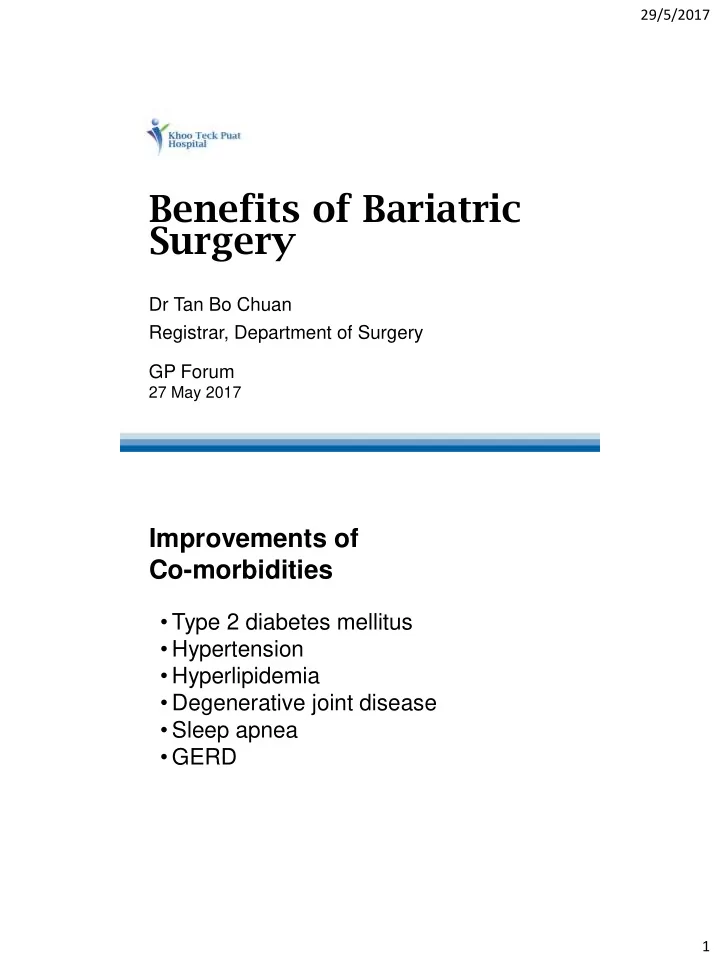

29/5/2017 Benefits of Bariatric Surgery Dr Tan Bo Chuan Registrar, Department of Surgery GP Forum 27 May 2017 Improvements of Co-morbidities • Type 2 diabetes mellitus • Hypertension • Hyperlipidemia • Degenerative joint disease • Sleep apnea • GERD 1
29/5/2017 Five-year outcome data showed that, among patients with type 2 diabetes and a BMI of 27 to 43, bariatric surgery plus intensive medical therapy was more effective than intensive medical therapy alone in decreasing, or in some cases resolving, hyperglycemia 2
29/5/2017 Psychological and Psychosocial Improvements • Depression • Low self-esteem and self-appraisal • Poor interpersonal relationships • Feelings of failure and dissatisfaction with life • Subject to prejudice and discrimination Psychological and Psychosocial Improvements • Significant improvement in QOL with all types of surgery • New vocational and social activities • Improved interpersonal relationships • Better moods, self-esteem • More employable 3
29/5/2017 Indications for Bariatric Surgery Singapore MOH CPG • Age 18-65 • BMI 40 or above or >35 with co-morbidity – Met Sx, OSA and Hypoventilation Sx, PCOS (IVF) • In Asia BMI criteria is 32.5 to 37.5 • Evaluated by a multidisciplinary team • Understand the requirement for a successful operation • Has participated in a Weight Lost Program • Weight related physical disability/QOL 4
29/5/2017 Indications for Surgery for Obesity and Weight-Related Diseases: Position Statements from the International Federation for the Surgery of Obesity and Metabolic Disorders (IFSO) Endorsed by IDF ADA DUK CGS DI AACE and others (59) Diabetes Care June 2016, 39 (6) 861-877 Surgery for obesity and weight-related diseases may be an effective therapeutic option for the management of T2DM in patients with obesity demonstrating good results in terms of glycemic control, glycosylated hemoglobin, and diabetes medications. Furthermore, surgical weight loss treatment improves components of the metabolic syndrome (MSx). This applies to patients with class I obesity (BMI >30 kg/m2) as well as patients with obesity of higher classes. Surgery for obesity and weight- related diseases reduces cardiovascular disease risk in terms of atherosclerosis, myocardial infarction, stroke, and death. OBES SURG 13/7/2016 Rationale of Surgery • Long term Outcome Data – Sustained Weight loss – Improvement/resolution of comorbidities – Improved long term survival • Minimal Invasive / Laparoscopic surgery 5
29/5/2017 TYPES OF BARIATRIC SURGERY OFFERED BY KTPH Types of Bariatric surgery • Endoscopic intragastric balloon • Laparoscopic gastric banding • Laparoscopic sleeve gastrectomy • Laparoscopic Roux-En-Y gastric bypass • Laparoscopic biliopancreatic diversion / duodenal switch 6
29/5/2017 Endoscopic Intragastric Balloon • Endoscopic procedures • Done under sedation • Day surgery • Balloon removal in 6 months • Projected weight loss about 15% • Abdominal discomfort, nausea and vomiting are common in the first three days. Laparoscopic Gastric Banding (LGB) 7
29/5/2017 Advantage of LGB • Induces excess weight loss of approximately 40 – 50 percent • Involves no removing of the stomach/ rerouting / anastomosis • Requires a shorter hospital stay – about 24 hours • Is reversible and adjustable • Has the lowest rate of early postoperative complications • Has the lowest risk for vitamin/mineral deficiencies Disadvantage of LGB • Slower and less early weight loss than other surgical procedures • Requires a foreign device to remain in the body • Can result in possible band slippage or band erosion into the stomach • Can result in dilation of the esophagus if the patient overeats • Requires strict adherence to the postoperative diet and to postoperative follow-up visits • Highest rate of re-operation 8
29/5/2017 Laparoscopic sleeve gastrectomy (LSG) • Surgical removal large portion of stomach following greater curve • Sleeve / tube with banana shaped is formed • Permanent procedure and non reversible LSG advantages • Restricts the amount of food the stomach can hold • Induces rapid and significant weight loss, weight loss of >50% for 3-5 year data • Requires no foreign objects and no bypass or re- routing of the food stream • Causes favourable changes in gut hormones (ghrelin) that suppress hunger, reduce appetite and improve satiety 9
29/5/2017 LSG disadvantage • Is a non-reversible procedure • Worsen reflux disease • Has the potential for long-term vitamin deficiencies • Has a higher early complication rate than the gastric banding (stapler line leakage / bleeding) Laparoscopic Roux-En-Y Gastric bypass (RYGB) 10
29/5/2017 RYGB advantages • Produces significant long-term weight loss, 60 to 80 percent excess weight loss • Highest rate of resolution of medical conditions eg Diabetes / Hypertension / Sleep apnoea • Typical maintenance of >50% excess weight loss • Produces favorable changes in gut hormones that reduce appetite and enhance satiety RYGB disadvantage • Is technically a more complex operation potentially could result in greater complication rates (anastomotic leak / bleeding) • Can lead to long-term vitamin/mineral deficiencies particularly deficits in vitamin B12, iron, calcium, and folate • Requires adherence to dietary recommendations, life-long vitamin/mineral supplementation, and follow-up compliance 11
29/5/2017 Laparoscopic biliopancreatic diversion / duodenal switch (BPD /DS) Advantages of BPD / DS • Results in greater weight loss than RYGB, LSG, or AGB, i.e. 60 – 70% percent excess weight loss or greater, at 5 year follow up • Reduces the absorption of fat by 70 percent or more • Causes favorable changes in gut hormones to reduce appetite and improve satiety 12
29/5/2017 Disadvantage of BPD / DS • Has highest complication rates and risk for mortality • Requires a longer hospital stay • Has a greater potential to cause protein deficiencies and long-term deficiencies in a number of vitamin and minerals, i.e. iron, calcium, zinc, fat-soluble vitamins such as vitamin D Conclusion • Referral criteria for Bariatric surgery – In Asia BMI criteria is > 32.5 with comorbidity or BMI > 37.5 • There is no “one size fits all” procedure 13
29/5/2017 Thank you 14
Recommend
More recommend